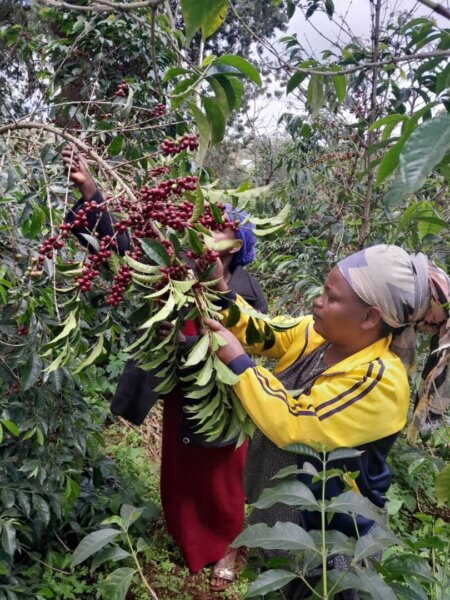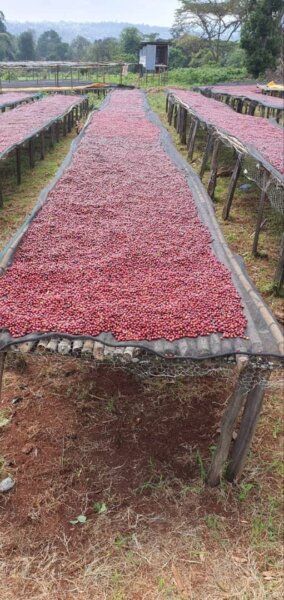About Natural Shakiso G3

 Kayon Mountain farm is located in the Oromia Region’s Guji Zone within the Shakiso woreda, in the Taro kebele. It was established in 2012 by a family who have been in coffee for a generation. Along with growing, the farm also does some amount of processing and exporting. Most families in the rural Taro Kebele make a living from farming, with coffee as a primary cash crop alongside subsistence crops for family consumption and other cash crops like bananas.
Kayon Mountain farm is located in the Oromia Region’s Guji Zone within the Shakiso woreda, in the Taro kebele. It was established in 2012 by a family who have been in coffee for a generation. Along with growing, the farm also does some amount of processing and exporting. Most families in the rural Taro Kebele make a living from farming, with coffee as a primary cash crop alongside subsistence crops for family consumption and other cash crops like bananas.
Taro washing station (one of the washing stations run by Kayon Mountain) is one the biggest processing sites in the area. Before Taro was established, producers from the area had to travel long distances from their farms to sell their coffee for unsustainable prices. This changed once Taro washing station was built, allowing local producers to easily sell their coffees, find better prices, and access more job opportunities within the washing station infrastructure.
In addition to premium coffee, Kayon Mountain has a focus on social responsibility. It has constructed a high school in Taro so that students won’t have to travel to receive education, distributed coffee seedlings to local producers, financially assisted member farmers in times of need, and supports an orphanage school in a neighboring village.
The farm has a total area of 150 hectares, all on fertile volcanic red soil or deep sandy loam. The harvest period in this area runs from October to January. The farm has a number of 30 permanent workers during the year and increases this number up to 450 workers during harvest time. They have approximately 3,500 coffee trees per hectare, intercropped with false banana trees for shade. They make compost from coffee pulp and, in general, try not to waste anything they can use instead for production or conservation.
Taro washing station has its own dry mill with capacity to produce 15 bags of parchment coffee per hour. Members hand-sort cherry, removing unripe and overripe cherries before sending them into flotation tanks where they’re covered in water. Any cherries that float (an indicator they’re unripe) are removed.
This is a natural processed coffee (often called “sundried” in Ethiopia), so instead of removing the fruit and drying in parchment, whole, ripe cherries are then dried in the sunshine on raised drying beds for about 15–18 days depending on the weather conditions. They’re turned regularly to prevent moisture concentration or overdrying. The cherries are covered with plastic or shade nets during the midday heat and at night.
The natural process is difficult to execute well: beans need to be turned frequently for consistent and even drying. It’s easy to end up with mold issues or an excess of fermentation flavor, or at the very least achieve an acceptable cup but overpower the natural terroir of the coffee (the unique flavor that comes from variety, soil, proper harvest, and clean processing). But, when done right, the results can be sublime, with the natural terroir of the coffee further enhanced by an additional injection of sweetness and high-impact fruit flavor.



 Kayon Mountain farm is located in the Oromia Region’s Guji Zone within the Shakiso woreda, in the Taro kebele. It was established in 2012 by a family who have been in coffee for a generation. Along with growing, the farm also does some amount of processing and exporting. Most families in the rural Taro Kebele make a living from farming, with coffee as a primary cash crop alongside subsistence crops for family consumption and other cash crops like bananas.
Kayon Mountain farm is located in the Oromia Region’s Guji Zone within the Shakiso woreda, in the Taro kebele. It was established in 2012 by a family who have been in coffee for a generation. Along with growing, the farm also does some amount of processing and exporting. Most families in the rural Taro Kebele make a living from farming, with coffee as a primary cash crop alongside subsistence crops for family consumption and other cash crops like bananas.